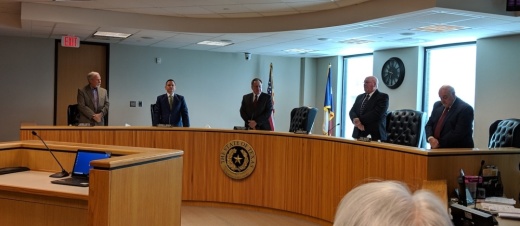Residents of Montgomery County will likely not face a shelter-in-place order like the ones neighboring counties have enacted—so long as they comply with coronavirus, or COVID-19, regulations, Montgomery County officials said.
The county has enacted increasingly stringent measures to limit the spread of coronavirus: first, encouraging individuals to refrain from large social gatherings, and then, limiting restaurants to takeout and delivery and closing nonessential businesses.
As of March 24, Gov. Greg Abbott has not issued a statewide shelter-in-place order, and it is up to individual counties to do so. At the March 24 Montgomery County Commissioners Court meeting, County Judge Mark Keough said he is not planning on issuing such an order as neighboring counties have—including Harris County, which issued a “Stay Home-Work Safe” order that same day.
“I have chosen, given my statutory ability and advice from many individuals ... At this point, we are not [enacting a shelter-in-place order],” Keough said. “We’re no longer putting any more restrictions on what we have.”
To avoid further restrictions, individuals must follow existing regulations and orders, Keough said.
“If people are in violation, we will end up with a shelter-in-place [order] if we don’t stand behind the orders we have implemented. ... The orders have teeth,” he said. “The [more] we refuse to self-regulate, it becomes a necessity for government to step in and start maintaining control.”
However, it is unclear to what extent the county overall is complying with Gov. Abbott's orders, or the extent to which local law enforcement has gone in regulating and enforcing orders.
“Our people are being compliant,” Keough said earlier in the discussion. “We have put some things in place that are working, and our county is doing it. ... Our county is doing an amazing job.”
Later, however, Keough said the county has responded to reports of businesses in violation.
“The sheriff’s office has followed up on those reports, [such as] restaurants with too many people. ... We’ve had a number of those,” he said.
Precinct 2 Commissioner Charlie Riley said he is more concerned that county officials and employees are not following the 10-person limit. More than 10 people, including the judge and commissioners, were present at the March 24 commissioners court meeting.
“I see the judges are sitting out there this morning,” Riley said. “We’ve still got the judges' courtrooms open. People are walking in there—30, 40, 50, 100 people. ... The county clerk ... and tax office [are still open]. ... This whole building is open.”
Riley said he does not know what the best course of action is but noted the futility of some efforts.
“I went by H-E-B this morning, and there’s probably 45 people standing in line next to one another,” he said. “I’m not advocating for shutting down the county, ... but the places that we’ve told them they couldn’t [congregate], they’re doing it.”
There is also the question of enforcement capacity. Keough vacillated as to what level of enforcement the county can and will take, although he said that his goal is to not turn the county into a “police state.”
“We don’t have the capacity, nor do our surrounding counties, of watching everybody in all these various things,” he said at one point, referring to the 10-person limit and ensuring restaurants and businesses are in compliance.
Later, Keough said District Attorney Brett Ligon and Sherriff Rand Henderson have “assured [the court] they will take action.”
“We have law enforcement all over the county who are ready and willing to bring people into compliance,” Keough said, “We will have our law enforcement group go and bring people into compliance. The objective here is not to arrest people, but we have the power to arrest; we have the power to take away liquor licenses; we have the power to enforce this.”





